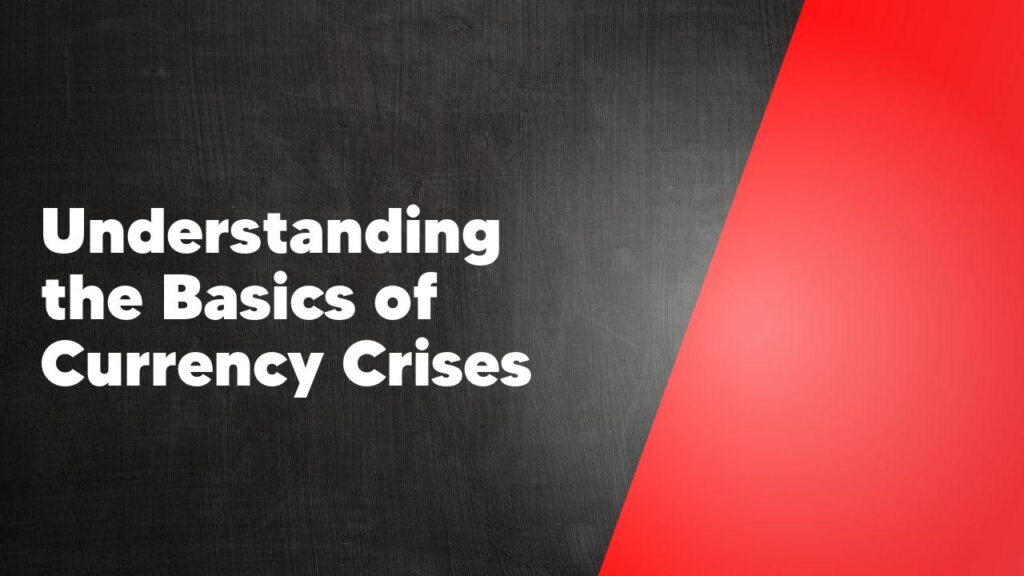Currency crises are a significant challenge for both developing and developed economies. These crises occur when a country’s currency loses value rapidly, leading to economic instability. Understanding the basics of currency crises is crucial for policymakers, investors, and individuals alike. This introductory article aims to provide a comprehensive overview of currency crises, exploring their causes, consequences, and possible preventive measures. Firstly, we will examine the main triggers of currency crises, such as weak fiscal policies, external shocks, and speculative attacks. Secondly, we will delve into the far-reaching consequences of currency crises, including hyperinflation, recession, and political instability. Lastly, we will explore the different strategies and policies that can help prevent or mitigate the impact of currency crises, such as fiscal austerity measures, exchange rate reforms, and international cooperation. By grasping the fundamentals of currency crises, stakeholders can make informed decisions to protect their economies and investments.
Causes of currency crises
Currency crises can be caused by a variety of factors, ranging from internal weaknesses within a country’s economy to external shocks in the global financial markets. One major cause is excessive government spending and budget deficits, which can lead to inflation and erode the value of a country’s currency. Political instability and corruption can also contribute to currency crises, as investors become wary of investing in a country with uncertain leadership and weak institutional frameworks. Moreover, sudden changes in monetary policy or regulations can create uncertainty and reduce investor confidence, triggering a currency crisis. Additionally, a country’s high levels of debt and low foreign exchange reserves can make it vulnerable to speculative attacks on its currency. Finally, external factors such as economic downturns in major trading partners, global financial crises, or sharp declines in commodity prices can significantly impact a country’s currency and lead to a crisis. In conclusion, currency crises are complex phenomena that often result from a combination of economic, political, and external factors. Understanding these causes is crucial for policymakers and investors alike in order to mitigate the risks and prevent future crises.
Impact on the global economy
The Forex market plays a significant role in the global economy, with its impact being felt across various sectors and regions. One of the key ways in which the Forex market influences the global economy is through exchange rate fluctuations. As currencies are traded against each other, their values can rise or fall, affecting the competitiveness of countries’ exports and imports. A weaker domestic currency can make a country’s exports more affordable and attractive to foreign buyers, leading to increased sales and economic growth. Conversely, a stronger currency can make imports cheaper and reduce the competitiveness of a country’s exports. Additionally, the Forex market provides an avenue for businesses and individuals to hedge against currency risks. By using derivative products, such as futures contracts or options, market participants can protect themselves against potential losses resulting from unfavorable exchange rate movements. This hedging capability can provide stability and confidence in international trade and investment, allowing businesses to focus on their core activities without being overly concerned about currency fluctuations. Overall, the Forex market’s impact on the global economy is extensive and multifaceted, influencing trade competitiveness, facilitating international transactions, and providing risk management tools for market participants.
Warning signs and indicators
When it comes to trading in the Forex market, it is crucial to pay attention to warning signs and indicators that can help guide decision-making. One of the essential indicators to track is volatility. High levels of volatility can indicate significant price movements, presenting both opportunities and risks. Another crucial warning sign is a sudden change in market sentiment. If sentiment shifts abruptly, it could suggest a change in market dynamics, potentially impacting currency prices. Additionally, monitoring economic indicators, such as interest rates and unemployment rates, is vital as they can greatly influence currency valuations. Lastly, keeping an eye on geopolitical events and news can help gauge market sentiment and identify potential trading opportunities or risks. By staying alert to these warning signs and indicators, traders can make more informed decisions and better navigate the ever-changing world of Forex trading.
Historical examples of currency crises
Throughout history, there have been numerous examples of currency crises that have rocked economies and caused significant financial turmoil. One notable example is the Latin American debt crisis of the 1980s, which saw several countries in the region default on their debts, leading to widespread currency devaluations and skyrocketing inflation rates. Another infamous currency crisis occurred in Asia in the late 1990s, commonly known as the Asian financial crisis. This crisis originated in Thailand and quickly spread to other countries in the region, resulting in massive devaluations of local currencies and a sharp contraction in economic growth. More recently, the European sovereign debt crisis, which unfolded in the aftermath of the global financial crisis of 2008, highlighted the vulnerabilities of the Eurozone. Countries such as Greece, Portugal, and Spain experienced severe economic recessions, high unemployment rates, and massive bailouts, as their debt levels became unsustainable. These currency crises not only affected the respective countries’ economies but also had far-reaching implications globally, with ripple effects on international trade, financial markets, and investor confidence. Overall, these historical examples serve as cautionary tales of the importance of strong fiscal management, sound economic policies, and vigilant monitoring of currency markets to prevent and mitigate the devastating impacts of currency crises.
Government interventions and policies
Government interventions and policies play a crucial role in shaping the Forex industry. Governments around the world implement various measures to promote stability and growth in their respective economies. One common intervention is the regulation of the Forex market. Governments often establish regulatory bodies to oversee the operations of Forex brokers and ensure fair trading practices. These regulations aim to protect investors from fraud and manipulation and maintain market integrity. Additionally, governments may also implement monetary policies to influence exchange rates and manage inflation. Central banks, acting on behalf of the government, can intervene in the Forex market through buying or selling currencies to stabilize exchange rates. Moreover, governments may use fiscal policies, such as taxation and spending, to stimulate or control economic growth, ultimately impacting the Forex market. Overall, government interventions and policies have a significant impact on the Forex industry, influencing market participants and shaping the overall trading environment.
Effects on businesses and investments
The Forex market has a significant impact on businesses and investments worldwide. Fluctuations in exchange rates can greatly affect global companies who operate in multiple countries and have to deal with different currencies. For example, if a company’s home currency strengthens against other currencies, its exports may become more expensive, leading to a decrease in demand. On the other hand, a weaker home currency can make a company’s exports more competitive and drive increased sales. Moreover, businesses involved in imports may face higher costs when the local currency weakens.
In terms of investments, Forex trading offers opportunities for investors to profit from currency movements. Traders can take advantage of anticipated changes in exchange rates by buying or selling currencies. By studying market trends, keeping track of economic indicators, and employing technical analysis, investors try to predict currency movements and make profitable trades. Additionally, Forex trading allows for leverage, meaning investors can control larger positions with a smaller amount of capital. This increases both potential returns and risks, making it important for traders to have a solid understanding of market dynamics.
Overall, the Forex market is a crucial factor to consider for businesses operating globally and investors seeking opportunities in currency trading. Being aware of the potential effects exchange rate fluctuations can have on businesses and investments is essential for making informed decisions in this dynamic and ever-changing market.
Role of speculation in currency crises
Speculation plays a pivotal role in currency crises, often acting as a catalyst for the sharp fluctuations in exchange rates. Speculators, driven by profit motives, engage in large-scale buying and selling of currencies in anticipation of future price movements. Their actions can intensify market volatility and exacerbate currency depreciation or appreciation. In times of economic uncertainty or political instability, speculators tend to flock to safe-haven currencies, putting pressure on weaker currencies. This speculative activity can create a self-fulfilling prophecy, as the increasing demand for safe-haven currencies leads to their further appreciation, while the weaker currencies spiral downwards. Speculation also occurs within the forex market itself, where traders make bets on the future direction of currency values. This speculative trading can amplify market movements and contribute to the rapid loss in confidence in a currency, triggering a currency crisis. As a result, central banks and governments often intervene to stabilize their currency’s value or implement measures to curb speculative activities. Nonetheless, speculation remains an integral part of the forex industry, impacting currency markets and playing a significant role in shaping the dynamics of currency crises.
Recovery strategies after a crisis
After a crisis in the Forex industry, it is crucial for businesses to develop effective recovery strategies. The first step is to assess the damage and understand the underlying causes of the crisis. This involves analyzing market trends, customer behavior, and internal processes. Once the problems are identified, businesses can start implementing corrective measures. This may involve reevaluating risk management practices, improving compliance procedures, and enhancing communication with clients. Additionally, businesses should focus on rebuilding trust and confidence in their brand. This can be done through transparent communication, offering incentives, and providing exceptional customer service. Lastly, businesses should learn from the crisis and develop contingency plans to mitigate the impact of future crises. By proactively addressing the issues that led to the crisis, businesses can pave the way for long-term success in the Forex industry.
Conclusion
In conclusion, understanding the basics of currency crises is crucial for individuals and businesses alike. It is important to recognize that currency crises can have devastating effects on economies, leading to high inflation, unemployment, and economic instability. By understanding the causes and symptoms of currency crises, individuals and businesses can make informed decisions to protect themselves against potential risks. Additionally, policymakers and governments can implement measures to prevent currency crises or mitigate their impact. This knowledge can help individuals and businesses navigate through challenging times and minimize their losses. Ultimately, gaining a solid understanding of currency crises and their implications is key to safeguarding financial stability and promoting economic growth.
1. What is a currency crisis?
A currency crisis refers to a situation where a country’s currency value suddenly drops, resulting in a loss of confidence in the currency by investors and the general public.
2. What causes a currency crisis?
Currency crises can be caused by various factors, such as economic imbalances, high levels of inflation, government debt, speculation, and political instability.
3. What are the effects of a currency crisis?
During a currency crisis, the effects can include a decrease in the purchasing power of the currency, higher inflation rates, increased borrowing costs, reduced foreign investments, and potential financial instability.
4. How do governments respond to currency crises?
Governments typically respond to currency crises by implementing measures such as raising interest rates, intervening in the foreign exchange market, implementing austerity measures, seeking external financial assistance, or even allowing the currency to float freely.
5. Can currency crises be prevented?
While it is difficult to completely prevent currency crises, governments can take measures to reduce the likelihood or mitigate the impact. These measures may include maintaining responsible fiscal and monetary policies, implementing structural reforms, diversifying the economy, and promoting a stable political environment.
6. How do currency crises impact international trade?
Currency crises can have significant impacts on international trade. A depreciating currency can make imports more expensive and exports more competitive, which can have both positive and negative effects on a country’s trade balance and economy.


